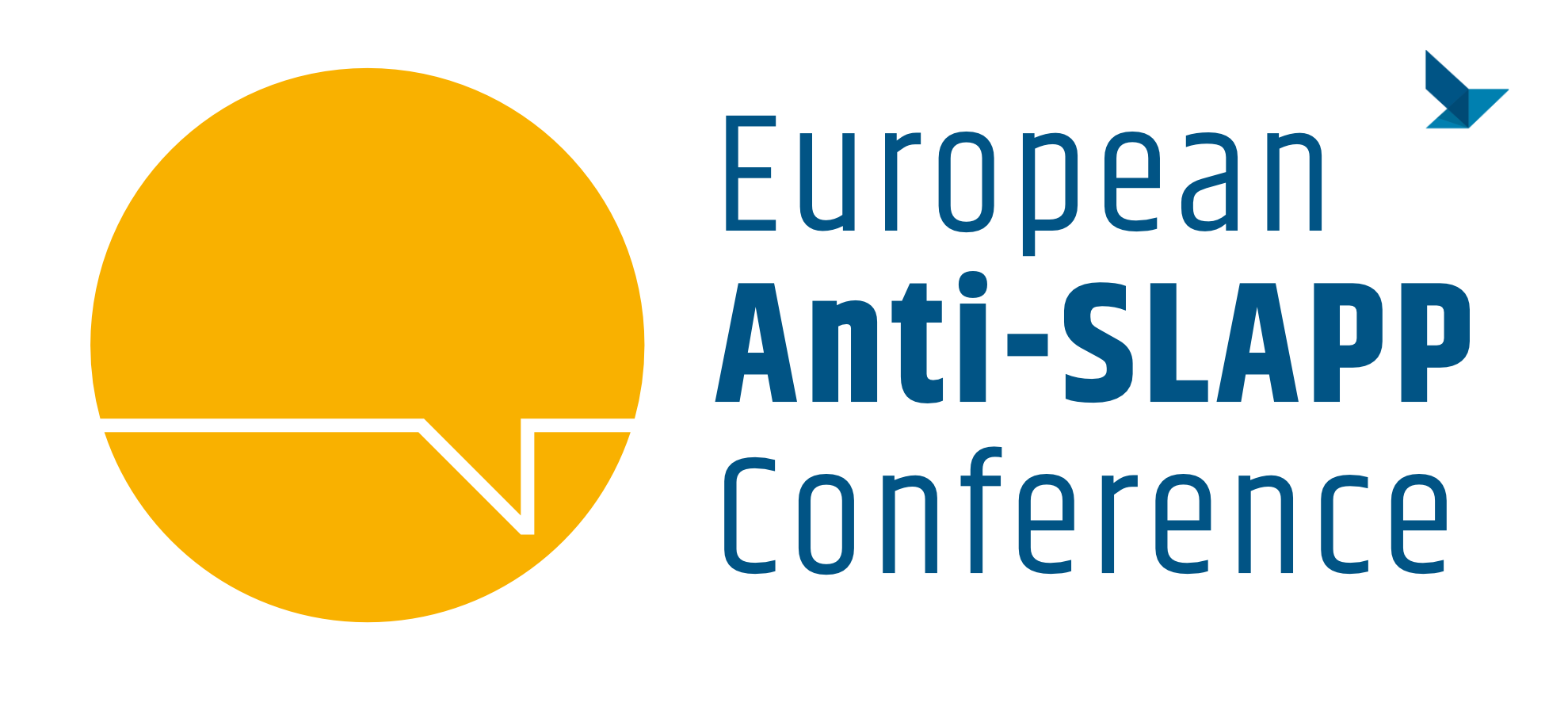Highlights from the Second European Anti-SLAPP Conference
The second European Anti-SLAPP Conference marked a crucial step forward in tackling the growing misuse of legal systems to suppress public participation and freedom of expression in Europe: strategic lawsuits against public participation (SLAPPs).
Co-organised by the Council of Europe, the Coalition Against SLAPPs in Europe (CASE), and the European Centre for Press and Media Freedom (ECPMF), the conference brought together various stakeholders at the Palais de l’Europe in Strasbourg on 14 November 2024, including representatives of European institutions, national authorities, legal experts, policymakers, academics, civil society leaders, journalists and activists.
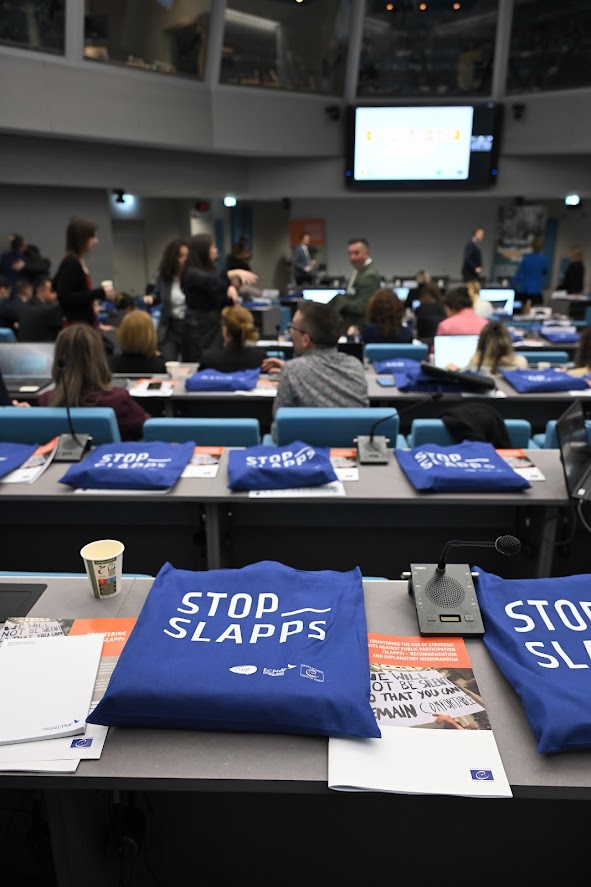
The primary objective of this second edition was to examine ways of effectively implementing the new legislative and policy frameworks designed to combat SLAPPs. These include the Council of Europe’s Recommendation, the EU Directive, and the European Commission Recommendation on countering SLAPPs.
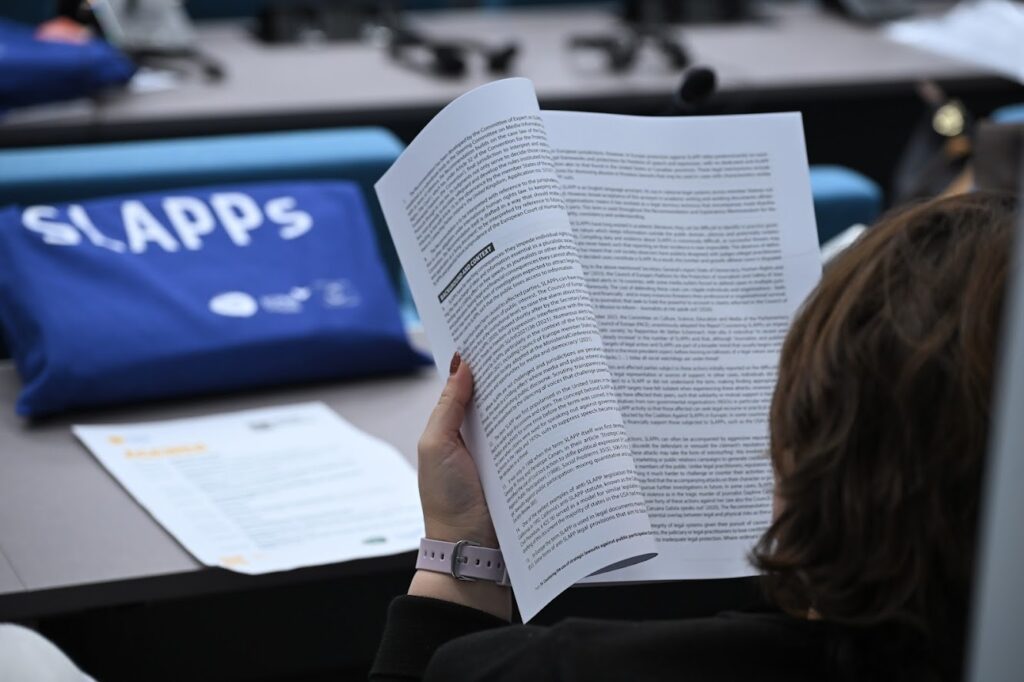
Here is an overview of key moments and critical discussions that unfolded.
Opening Remarks and National Dimensions
After a welcome address by Flutura Kusari, Senior Legal Advisor at ECPMF and Charlie Holt, European Lead at Global Climate Legal Defense, opening remarks were delivered by Bjørn Berge, Deputy Secretary General of Council of Europe, and Gill Phillips, Former Legal Director at The Guardian. Berge emphasised, “We must prioritise the implementation of the Council of Europe Recommendation and determine our next steps. Despite our progress, challenges persist. The fight against SLAPPs continues to evolve, yet it is only the tip of the iceberg.”
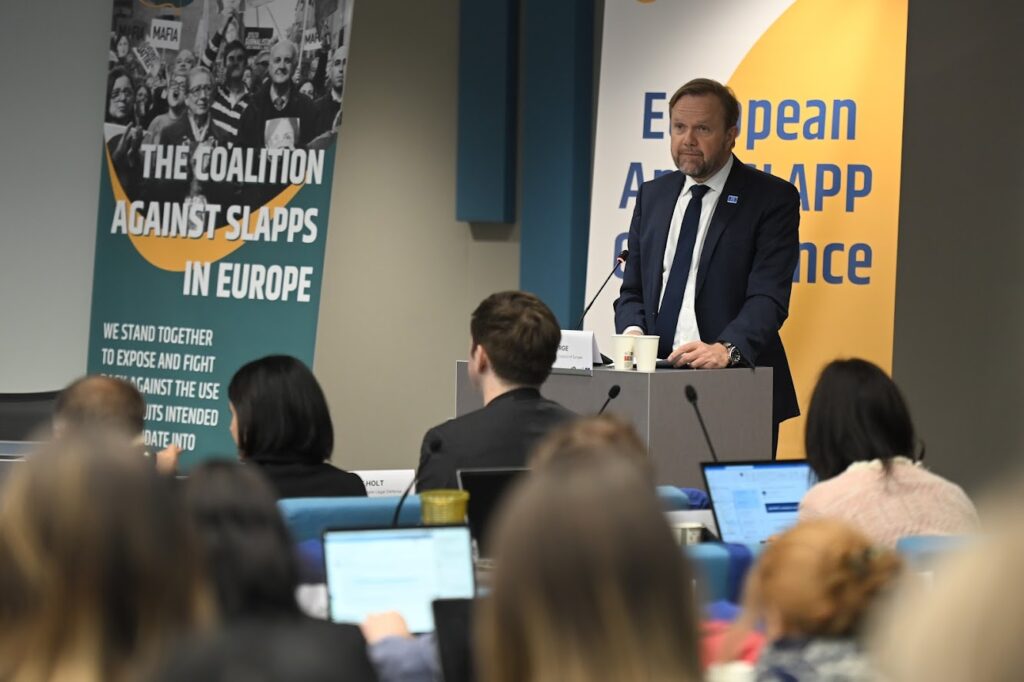
The agenda commenced with an examination of the various legislative and policy efforts to combat SLAPPs at the national level. Moderated by Giulia Lucchese, Administrator in the Freedom of Expression and CDMSI Division of the Council of Europe, the panel featured a distinguished group of speakers, including Tedi Dobi, Deputy Minister of Justice of Albania; Nadia Hashmi, United Kingdom Deputy Permanent Representative to the Council of Europe and other government officials from ministries of justice in Council of Europe member states, including Miha Verčko (Slovenia), Dominika Ziętara (Poland), Petra Jurina (Croatia), and Jeannine Dennewald (Luxembourg).
While Nadia Hashmi identified the UK “as one of the most SLAPP-friendly jurisdictions”, Miha Verčko announced a new anti-SLAPP law to soon be adopted in Slovenia: “The scope of the new law will be broader, and we will address SLAPPs in the context of public debate. One of the biggest challenges is defining SLAPPs in a way that isn’t too complex.”
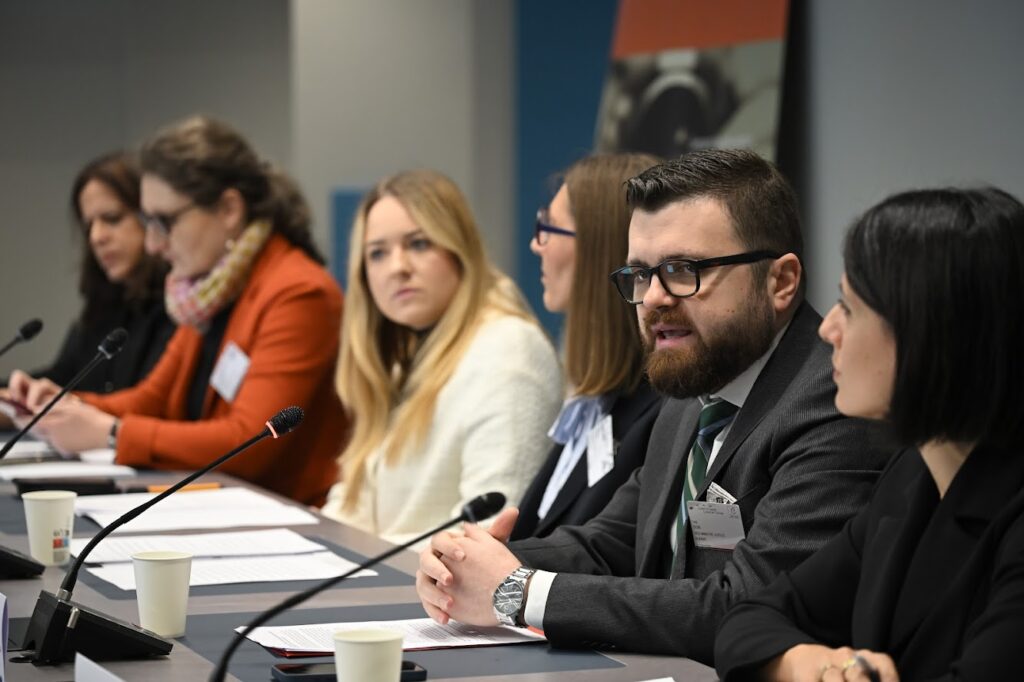
Understanding Human Impact, Legal Frameworks, and Case Law on SLAPPs
Next on the agenda was a powerful testimony by freelance investigative journalist Parcival Weijnen, co-founder of Investigative Collective Spit. Weijnen’s account, guided by Charlie Holt, shed light on the severe mental, financial, and professional toll of abusive legal actions on individuals investigating matters of public interest, offering a stark reminder of the human cost of SLAPPs.
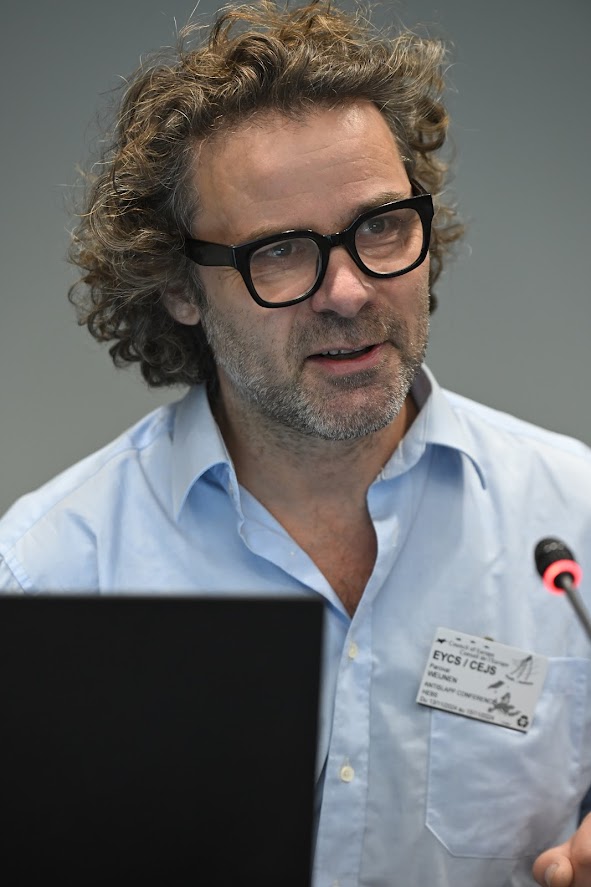
Moderated by Flutura Kusari, the second panel delved into the recent legal frameworks introduced in Europe to counter SLAPPs. Irena Guidikova from the Council of Europe and Pia Lindholm from the European Commission outlined the newly adopted standards, including Council of Europe’s Recommendation on countering SLAPPs (2024)2, the Commission Recommendation on protecting journalists and human rights defenders (2022)758, and the EU Directive on protecting persons who engage in public participation from SLAPPs (2024/1069). Guidikova reminded the audience of the necessity to regularly review the Recommendation to ensure its continued relevance.
On the other hand, Ali Bozkaya, Lawyer and Freedom of Expression Case Law Coordinator at the European Court of Human Rights, presented an in-depth analysis of the Court’s relevant case law on SLAPPs. He mentioned the profound implications these lawsuits have on fundamental freedoms, noting their chilling effect on freedom of expression and public participation, safeguarded under Article 10 of the European Convention on Human Rights.
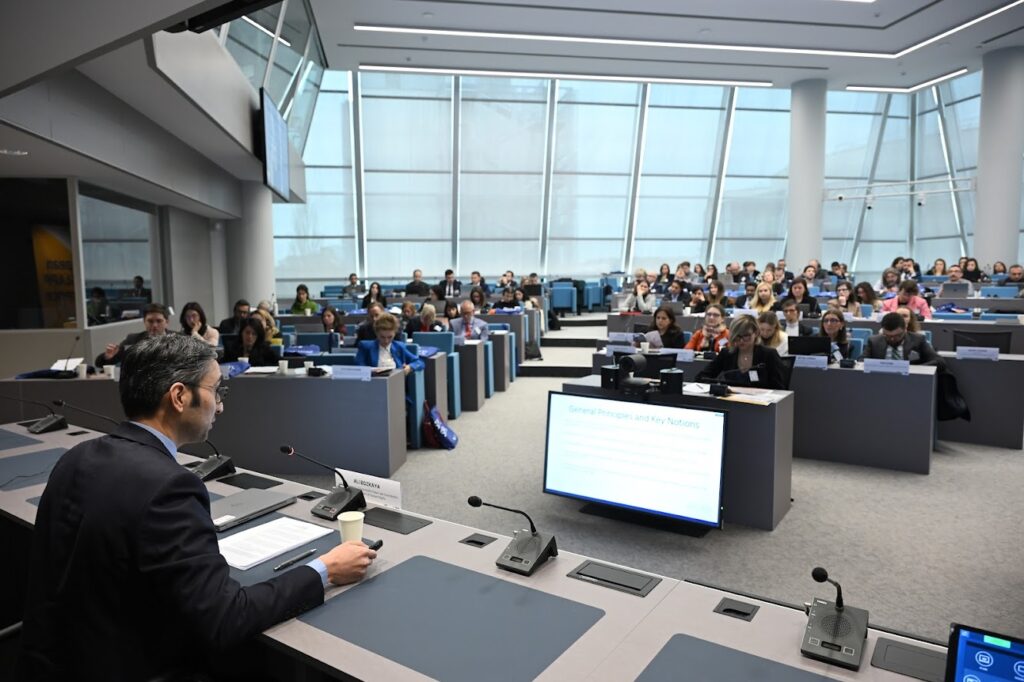
To explore the vital role of civil society in combating SLAPPs, CASE’s coordinated efforts across Europe took centre stage. Representatives from several national working groups spanning the UK, Belgium, Italy, the Netherlands, and Poland participated in a discussion led by Jessica Ní Mhainín (Index on Censorship). Prof. em. Dirk Voorhoof (Human Rights Centre Ghent University) emphasised that SLAPPs are a “systemic phenomenon, which needs systemic reaction.” Adding on to ongoing advocacy efforts targeting victims and the general public, Joanna Szymanska (ARTICLE 19) highlighted their joint initiative with media outlets calling on authorities to implement the EU Directive more broadly. They were joined by Sielke Beata Kelner (Osservatorio Balcani e Caucaso Transeuropa) from Italy, Jasmijn de Zeeuw (Free Press Unlimited) from the Netherlands and Susan Coughtrie (Foreign Policy Centre) from the UK.
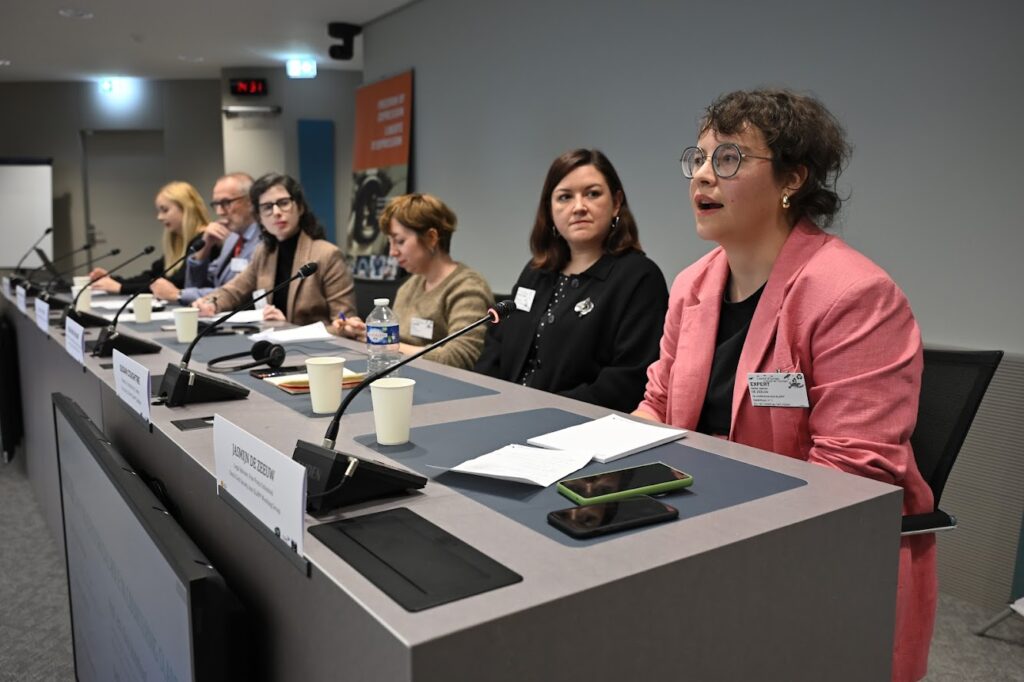
The session, “Capacity Building and Training to Combat SLAPPs” moderated by Francesca Carlsson (European Environmental Bureau) explored practical measures to enhance the fight against SLAPPs. Alina Tatarenko (Council of Europe) highlighted co-operation projects of the Freedom of Expression Division of the Council of Europe, stressing the critical need for judicial training to address judges’ hesitation to handle SLAPP cases. Daniel Simons (Greenpeace International) presented the CASE Guidebook as a practical resource, while Charlie Holt (Global Climate Legal Defense) underscored that the strength of an anti-SLAPP law lies in its details. The session, “Capacity Building and Training to Combat SLAPPs” moderated by Francesca Carlsson (European Environmental Bureau) explored practical measures to enhance the fight against SLAPPs. Alina Tatarenko (Council of Europe) highlighted co-operation projects of the Freedom of Expression Division of the Council of Europe, stressing the critical need for judicial training to address judges’ hesitation to handle SLAPP cases. Daniel Simons (Greenpeace International) presented the CASE Guidebook as a practical resource, while Charlie Holt (Global Climate Legal Defense) underscored that the strength of an anti-SLAPP law lies in its details. The session, “Capacity Building and Training to Combat SLAPPs” moderated by Francesca Carlsson (European Environmental Bureau) explored practical measures to enhance the fight against SLAPPs. Alina Tatarenko (Council of Europe) highlighted co-operation projects of the Freedom of Expression Division of the Council of Europe, stressing the critical need for judicial training to address judges’ hesitation to handle SLAPP cases. Daniel Simons (Greenpeace International) presented the CASE Guidebook as a practical resource, while Charlie Holt (Global Climate Legal Defense) underscored that the strength of an anti-SLAPP law lies in its details. ECPMF’s Flutura Kusari also contributed to the discussion, reminding of the enduring impact of Daphne Caruana Galizia’s case, stating, “Daphne, when assassinated, had around 50 defamation cases; we are here because of her.”
The final panel, titled “Ensuring Transparency, Collection of Data and Effective Support for Targets and Victims,” was moderated by Maja Sever, President of the European Federation of Journalists (EFJ) and Trade Union of Croatian Journalists. The discussion featured Florent Duplouy (Platform for the Protection of Journalists, Council of Europe), Liana Ganea (ActiveWatch), Tina Urso (Daphne Caruana Galizia Foundation), Rebecca Bonello Ghio (EFJ), and Marie Gasser (ECPMF). While acknowledging the challenges in documenting SLAPP cases due to their complex nature, the panel also introduced the upcoming European Anti-SLAPP Monitor, a tool designed to track and evaluate how effectively countries are protecting journalists from SLAPPs.
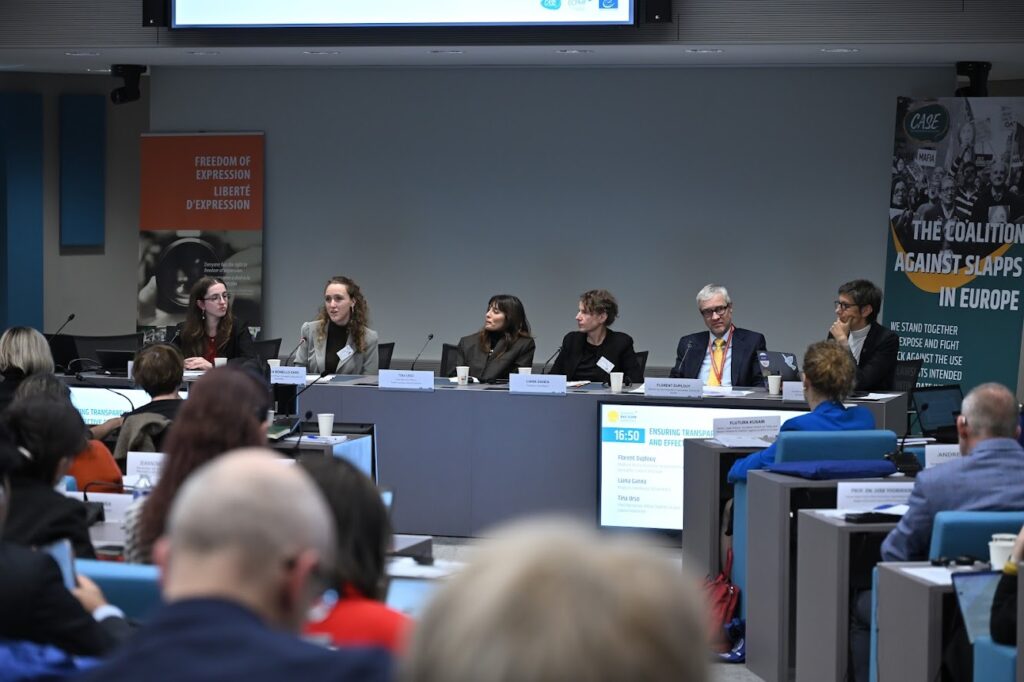
Closing Remarks: What Future for the Fight against SLAPPs?
Matjaž Gruden, Director of the Directorate for Democracy at the Council of Europe, closed the Second European Anti-SLAPP Conference with a compelling reflection on the ongoing fight against SLAPPs, acknowledging both the progress made and the challenges that lie ahead. As he rightly stated, “Our democracies are under pressure, we are in crisis. Protecting media freedom and journalists is the place to start.” This sentiment captured the essence of the discussions throughout the event, as panellists shared insights and strategies aimed at addressing the systemic threats posed by SLAPPs.
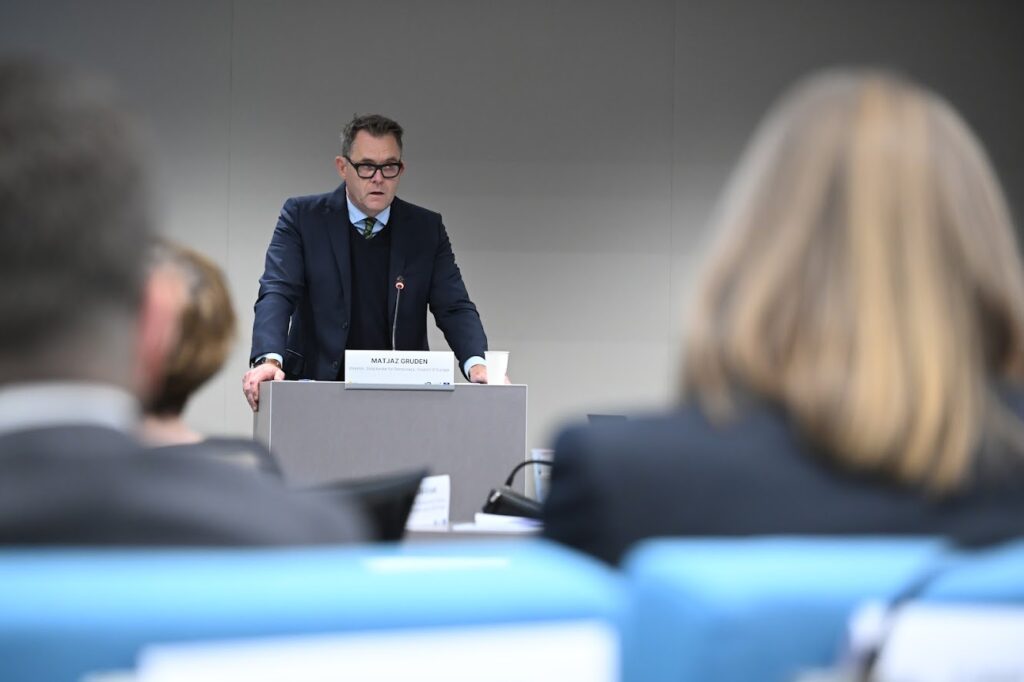
The conference offered a thorough examination of critical topics, including the definition of SLAPPs, procedural safeguards, victim support, and effective remedies, alongside the vital need for education and collaboration to combat SLAPPs across Europe.
We extend our sincere gratitude to the co-organisers—Council of Europe, the Coalition Against SLAPPs in Europe (CASE), and the European Centre for Press and Media Freedom (ECPMF)—as well as all contributors and participants for making this event possible. Your commitment to tackling SLAPPs and advancing media freedom is invaluable. Together, we are building momentum towards a stronger, more resilient defence of freedom of press, public participation, rule of law, and democracy across Europe.
The conference photo gallery is available here. Special acknowledgement to Christian Creutz for capturing these memorable moments.
